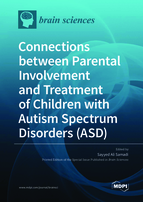Connections between Parental Involvement and Treatment of Children with Autism Spectrum Disorders (ASD)
A special issue of Brain Sciences (ISSN 2076-3425). This special issue belongs to the section "Developmental Neuroscience".
Deadline for manuscript submissions: closed (30 October 2020) | Viewed by 41418
Special Issue Editor
Interests: Autism Spectrum Disorders; Autism; Parental Based Early Intervention; Parenting Interventions; Developmental Disabilities; Caregiving impacts; Intellectual and Developmental Disabilities
Special Issues, Collections and Topics in MDPI journals
Special Issue Information
Dear Colleagues,
Parent-mediated interventions are widely considered to be an effective treatment model for a variety of childhood developmental disabilities such as Autism Spectrum Disorders (ASD), and there is a wealth of research findings to support this justification. In this regard, understanding parents' information needs right after their child’s diagnosis of ASD is a key factor, particularly with respect to the challenges associated with caring for a child with a lifelong disability.
The main aim of this Special Issue of Brain Sciences is to provide a platform for international professionals, researchers, and educators who are engaged in parent-based intervention services to share their latest research. Topics of interest include, but are not limited to, the following: challenges associated with parent training for parents of children with ASD, impacts of cultural issues on parental involvement in interventions, individuals with ASD who have benefitted from parent-based interventions, predicting variables (child /other) that determine a child’s response to treatment, essential factors in conducting effective parent training sessions; moderators and mediators of effects and outcome measures for parental involvement in interventions, program components that should be replicated, and facilitating and enhancing outcomes of parental-based interventions for parents and their children.
We invite authors to submit relevant research papers (qualitative, quantitative, and mixed method approaches), reviews, meta-analyses, systematic reviews, policy-oriented research, and comparative research.
Dr. Sayyed Ali Samadi
Guest Editor
Manuscript Submission Information
Manuscripts should be submitted online at www.mdpi.com by registering and logging in to this website. Once you are registered, click here to go to the submission form. Manuscripts can be submitted until the deadline. All submissions that pass pre-check are peer-reviewed. Accepted papers will be published continuously in the journal (as soon as accepted) and will be listed together on the special issue website. Research articles, review articles as well as short communications are invited. For planned papers, a title and short abstract (about 100 words) can be sent to the Editorial Office for announcement on this website.
Submitted manuscripts should not have been published previously, nor be under consideration for publication elsewhere (except conference proceedings papers). All manuscripts are thoroughly refereed through a single-blind peer-review process. A guide for authors and other relevant information for submission of manuscripts is available on the Instructions for Authors page. Brain Sciences is an international peer-reviewed open access monthly journal published by MDPI.
Please visit the Instructions for Authors page before submitting a manuscript. The Article Processing Charge (APC) for publication in this open access journal is 2200 CHF (Swiss Francs). Submitted papers should be well formatted and use good English. Authors may use MDPI's English editing service prior to publication or during author revisions.
Keywords
- Autism Spectrum Disorders
- parent-based intervention
- parenting intervention
- parent training







